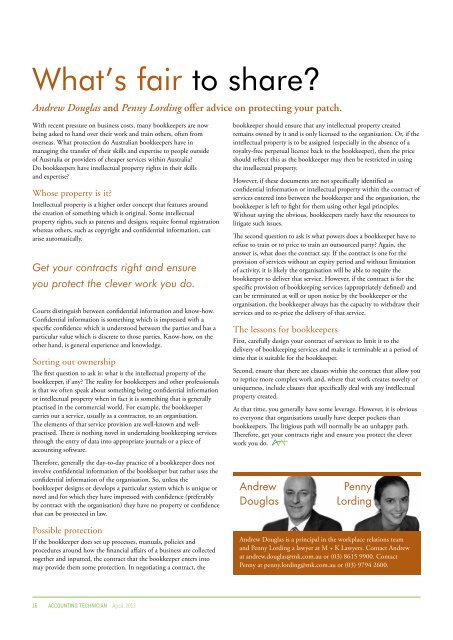best foot forward - Association of Accounting Technicians
best foot forward - Association of Accounting Technicians
best foot forward - Association of Accounting Technicians
Create successful ePaper yourself
Turn your PDF publications into a flip-book with our unique Google optimized e-Paper software.
What’s fair to share?<br />
Andrew Douglas and Penny Lording <strong>of</strong>fer advice on protecting your patch.<br />
With recent pressure on business costs, many bookkeepers are now<br />
being asked to hand over their work and train others, <strong>of</strong>ten from<br />
overseas. What protection do Australian bookkeepers have in<br />
managing the transfer <strong>of</strong> their skills and expertise to people outside<br />
<strong>of</strong> Australia or providers <strong>of</strong> cheaper services within Australia?<br />
Do bookkeepers have intellectual property rights in their skills<br />
and expertise?<br />
Whose property is it?<br />
Intellectual property is a higher order concept that features around<br />
the creation <strong>of</strong> something which is original. Some intellectual<br />
property rights, such as patents and designs, require formal registration<br />
whereas others, such as copyright and confidential information, can<br />
arise automatically.<br />
Get your contracts right and ensure<br />
you protect the clever work you do.<br />
Courts distinguish between confidential information and know-how.<br />
Confidential information is something which is impressed with a<br />
specific confidence which is understood between the parties and has a<br />
particular value which is discrete to those parties. Know-how, on the<br />
other hand, is general experience and knowledge.<br />
Sorting out ownership<br />
The first question to ask is: what is the intellectual property <strong>of</strong> the<br />
bookkeeper, if any? The reality for bookkeepers and other pr<strong>of</strong>essionals<br />
is that we <strong>of</strong>ten speak about something being confidential information<br />
or intellectual property when in fact it is something that is generally<br />
practised in the commercial world. For example, the bookkeeper<br />
carries out a service, usually as a contractor, to an organisation.<br />
The elements <strong>of</strong> that service provision are well-known and wellpractised.<br />
There is nothing novel in undertaking bookkeeping services<br />
through the entry <strong>of</strong> data into appropriate journals or a piece <strong>of</strong><br />
accounting s<strong>of</strong>tware.<br />
bookkeeper should ensure that any intellectual property created<br />
remains owned by it and is only licensed to the organisation. Or, if the<br />
intellectual property is to be assigned (especially in the absence <strong>of</strong> a<br />
royalty-free perpetual licence back to the bookkeeper), then the price<br />
should reflect this as the bookkeeper may then be restricted in using<br />
the intellectual property.<br />
However, if these documents are not specifically identified as<br />
confidential information or intellectual property within the contract <strong>of</strong><br />
services entered into between the bookkeeper and the organisation, the<br />
bookkeeper is left to fight for them using other legal principles.<br />
Without saying the obvious, bookkeepers rarely have the resources to<br />
litigate such issues.<br />
The second question to ask is what powers does a bookkeeper have to<br />
refuse to train or to price to train an outsourced party? Again, the<br />
answer is, what does the contract say. If the contract is one for the<br />
provision <strong>of</strong> services without an expiry period and without limitation<br />
<strong>of</strong> activity, it is likely the organisation will be able to require the<br />
bookkeeper to deliver that service. However, if the contract is for the<br />
specific provision <strong>of</strong> bookkeeping services (appropriately defined) and<br />
can be terminated at will or upon notice by the bookkeeper or the<br />
organisation, the bookkeeper always has the capacity to withdraw their<br />
services and to re-price the delivery <strong>of</strong> that service.<br />
The lessons for bookkeepers<br />
First, carefully design your contract <strong>of</strong> services to limit it to the<br />
delivery <strong>of</strong> bookkeeping services and make it terminable at a period <strong>of</strong><br />
time that is suitable for the bookkeeper.<br />
Second, ensure that there are clauses within the contract that allow you<br />
to reprice more complex work and, where that work creates novelty or<br />
uniqueness, include clauses that specifically deal with any intellectual<br />
property created.<br />
At that time, you generally have some leverage. However, it is obvious<br />
to everyone that organisations usually have deeper pockets than<br />
bookkeepers. The litigious path will normally be an unhappy path.<br />
Therefore, get your contracts right and ensure you protect the clever<br />
work you do.<br />
Therefore, generally the day-to-day practice <strong>of</strong> a bookkeeper does not<br />
involve confidential information <strong>of</strong> the bookkeeper but rather uses the<br />
confidential information <strong>of</strong> the organisation. So, unless the<br />
bookkeeper designs or develops a particular system which is unique or<br />
novel and for which they have impressed with confidence (preferably<br />
by contract with the organisation) they have no property or confidence<br />
that can be protected in law.<br />
Andrew<br />
Douglas<br />
Penny<br />
Lording<br />
Possible protection<br />
If the bookkeeper does set up processes, manuals, policies and<br />
procedures around how the financial affairs <strong>of</strong> a business are collected<br />
together and inputted, the contract that the bookkeeper enters into<br />
may provide them some protection. In negotiating a contract, the<br />
Andrew Douglas is a principal in the workplace relations team<br />
and Penny Lording a lawyer at M + K Lawyers. Contact Andrew<br />
at andrew.douglas@mk.com.au or (03) 8615 9900. Contact<br />
Penny at penny.lording@mk.com.au or (03) 9794 2600.<br />
16 accounting technician April 2013


